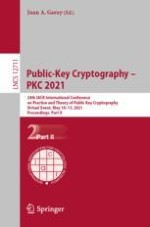2021 | OriginalPaper | Buchkapitel
Private Set Operations from Oblivious Switching
verfasst von : Gayathri Garimella, Payman Mohassel, Mike Rosulek, Saeed Sadeghian, Jaspal Singh
Erschienen in: Public-Key Cryptography – PKC 2021
Aktivieren Sie unsere intelligente Suche, um passende Fachinhalte oder Patente zu finden.
Wählen Sie Textabschnitte aus um mit Künstlicher Intelligenz passenden Patente zu finden. powered by
Markieren Sie Textabschnitte, um KI-gestützt weitere passende Inhalte zu finden. powered by
